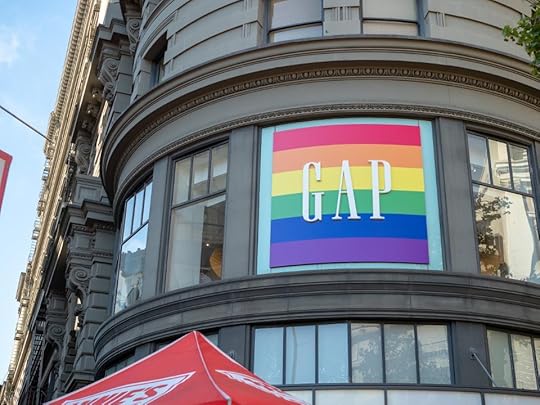Working The Rainbow — 5 Retailers That LGBTQ Employees Support
We see a lot rainbows in June. But what about July through May?
 Image: Getty
Image: GettyAn
avalanche of corporations come out to support the LGBTQ community during Pride
Month — typically through the sale of color-splashed products — but during the
rest of the year, those rainbows tend to fade and with them, seemingly, so does
the support.
Yet
those 11 months, July through May, are when the public should measure how well organizations,
including retailers, stand behind equal human rights and inclusivity. In few ways
is this measure as effective as in the workplace: A recent Glassdoor
survey conducted by The Harris Poll reveals that 53% of LGBTQ employees (lesbian, gay, bisexual,
transgender and queer/questioning) have experienced or
witnessed anti-LGBTQ comments by co-workers.
So instead of lauding
the brands that support Pride in June, how about recognizing those the LGBTQ
community supports all the time, through their hard work? Here’s a list of five
retail brands that champion LBGTQ rights year-round and are embraced by the
community, based on Glassdoor rankings.
1: Ikea Group
The
Swedish home furnishings merchant Ikea has formally embedded diversity into its
values and expects its staff to practice inclusive behaviors in collaborative
ways. To this end, offers
training
on LGBT+ inclusion to enlighten workers of their possible unconscious
biases regarding sexual orientation and gender identity, and how to reduce
these biases.
Among its benefits for
LGBT+ workers and families: Ikea’s U.S. medical plan covers a portion of gender
confirmation counseling and surgery.
As one employee
from Ohio describes Ikea: “I receive great benefits; as well as the equal
opportunities to pass those benefits along to my wife to help start and grow
our family. I am so proud Ikea honors our #uniqueness and celebrates our
individuality globally.”
The
$32-billion
beverage and snack foods brand operates an LGBTQA
Business Resource Group (lesbian, gay, bisexual, transgender,
queer/questioning and asexual), in operation for almost 15 years, and was among
the first companies to support new U.N. standards for LGBTI (lesbian, gay,
bisexual, transgender and intersex) rights. It also offers benefits packages
that serve as safety nets for LBGTQ employees, as Glassdoor reports:
“In
2011, the company began offering and in 2015 it began assisting with the costs
of taxes imposed on eligible U.S. employees whose same-sex spouse or partner
was enrolled in health benefits and who lived in states that did not recognize
same-sex marriage.”
Separately,
Coca-Cola in January was included in the 2019
Bloomberg Gender-Equality Index for its initiatives involving gender
equality in the workplace.
3: Gap Inc.
The
fashion brand Gap in 2014 was the
first Fortune 500 company to confirm that it pays men and women equally for
the same work, and it extends that equality across the spectrum. Gap has organized
a group within the company called GEAR — Gay Employees, Allies and Resources
— dedicated to creating an inclusive and supportive environment for its
LGBTQ employees.
In terms of employee
benefits, GAP provides an adoption assistance reimbursement plan (important
to same-sex couples) as well as a pet discount program to offset the cost of
veterinarian care, per services and supplies. In 2018, employees of its Old Navy brand voted it among the 100 Best
Places Workplaces for Diversity: “They walk the talk when it comes to community
involvement, equality and equal rights.”
4: Apple
When a company’s CEO is gay, you can expect it
opens its arms to all members of the LGBTQ community, and Apple has done so since
long before appointing Tim Cook. More than half of Apple’s employees (53%) are from historically
underrepresented groups in technology. And for decades, its Diversity
Network Associations have presented places for workers to connect with
confidence. More than 25,000 Apple employees participate in one of the associations,
which include Pride@Apple, Accessibility@Apple, Amigos@Apple, Black@Apple and
Women@Apple.
“Being a leader at Apple means you’re held
accountable for creating an environment where people feel included and
welcomed,” Apple employee Consuela, a mixed-race woman who is part of the LBGQT+
community, states on Apple’s website.
“It’s not just a recommendation. It’s expected of you.”
5: Target
Target distinguishes
itself among shoppers for its exclusive, limited-time designer labels, but
among workers it is known
for inclusion. More than 10,000 of its staff members participate in its
six diversity business councils. The groups — LGBTQ+ African American, Asian American, military and women — provide
onboarding, networking and professional development opportunities.
In 2015, Target published a Pride
manifesto to showcase its consistent commitment to creating an inclusive
culture. In 2016, Target further supported its commitment by publicly reinforcing
its policy
on restroom and fitting room use, which states employees and customers are
free to use the rooms that correspond with their gender identities.
These efforts matter every day of the year to
employees, as well as to shoppers. And they should matter to all retail brands.
When seeking Pride support, people are learning that the best measure of
authenticity is in seeing a brand’s true colors in July, and afterward.
This article originally appeared in Forbes . Follow me on Facebook and Twitter for more on retail, loyalty and the customer experience.
Bryan Pearson's Blog
- Bryan Pearson's profile
- 4 followers



